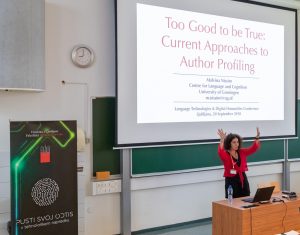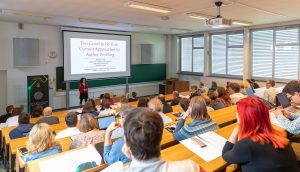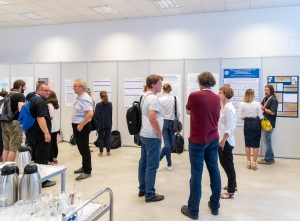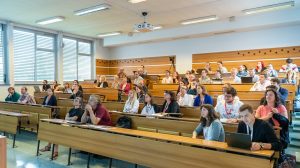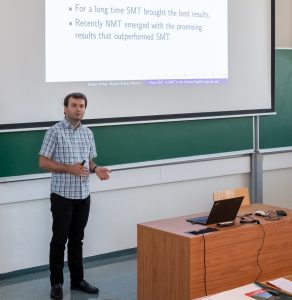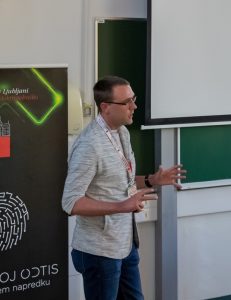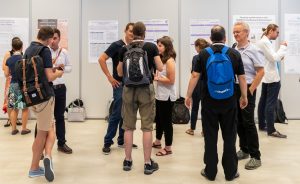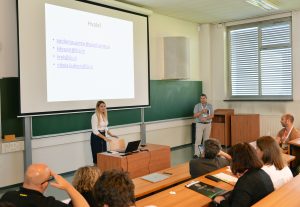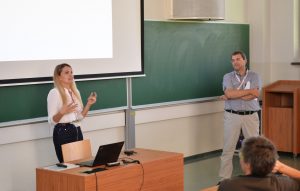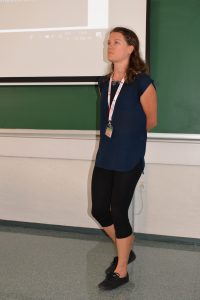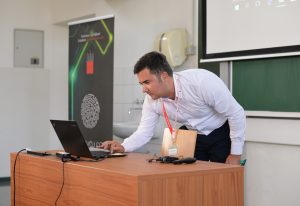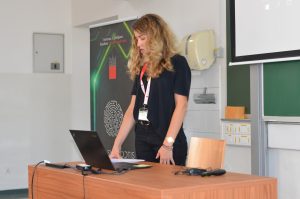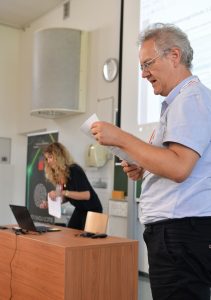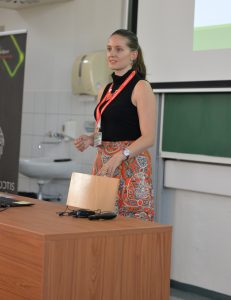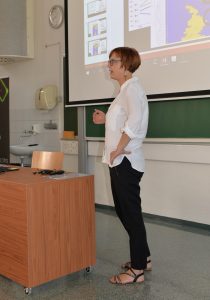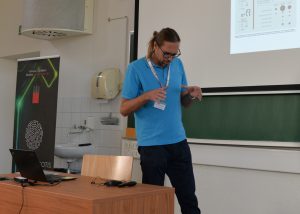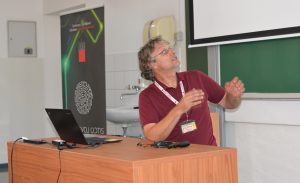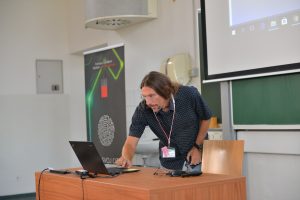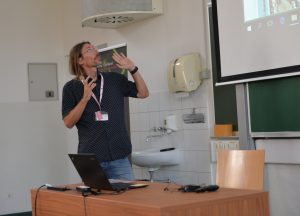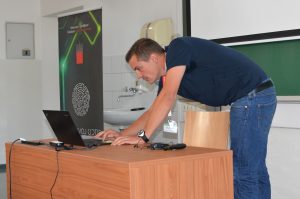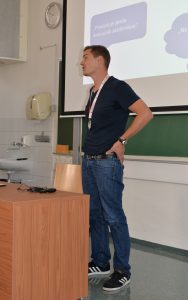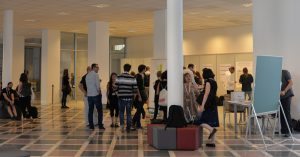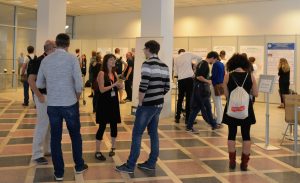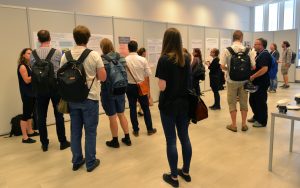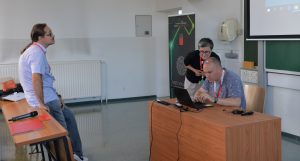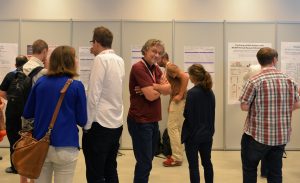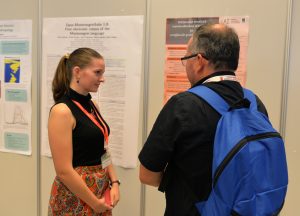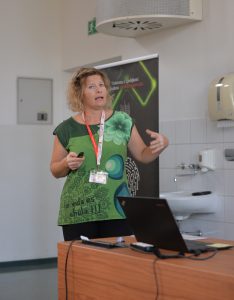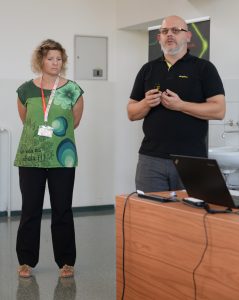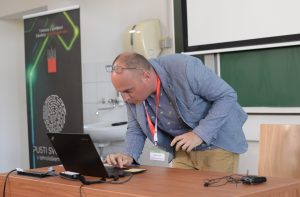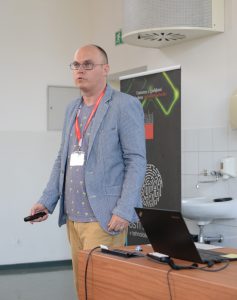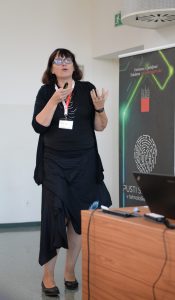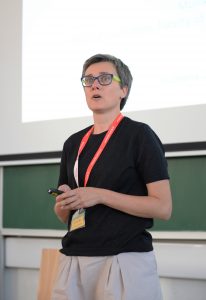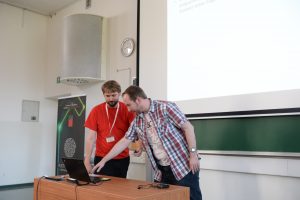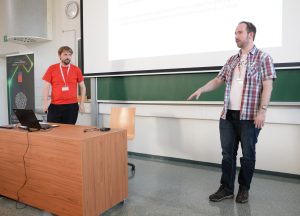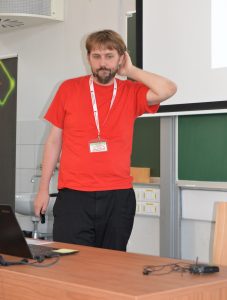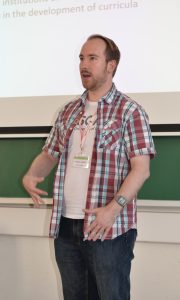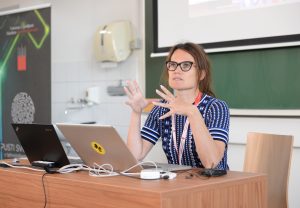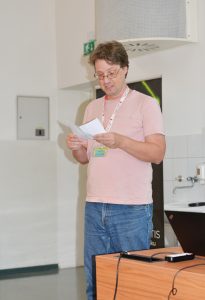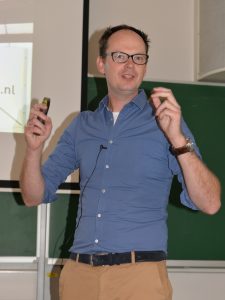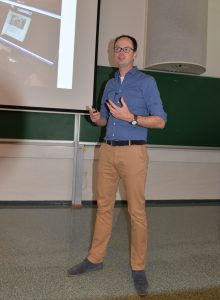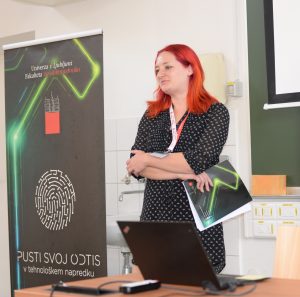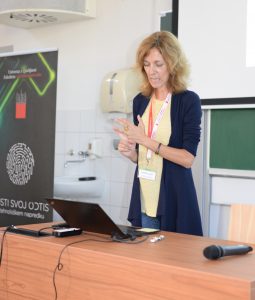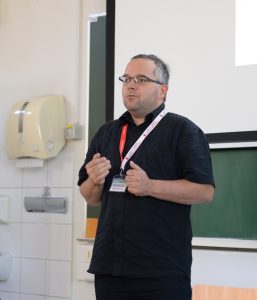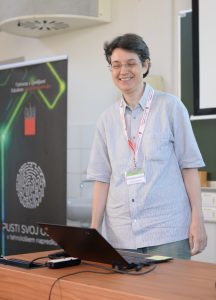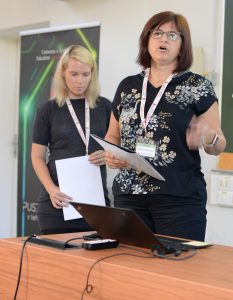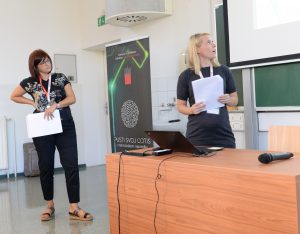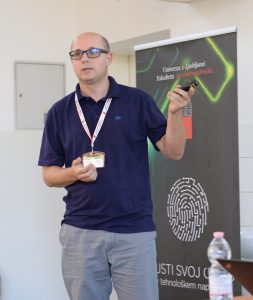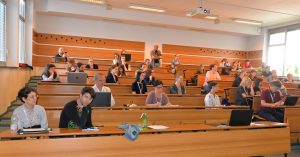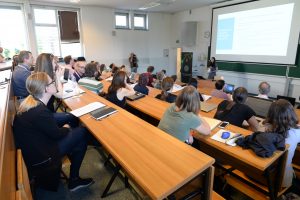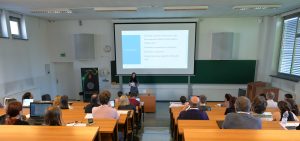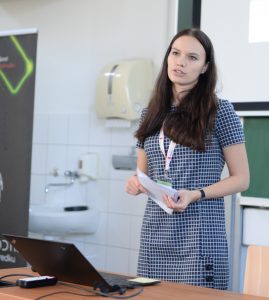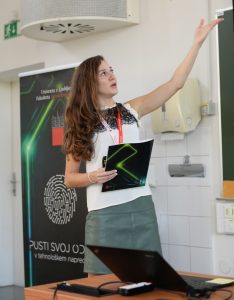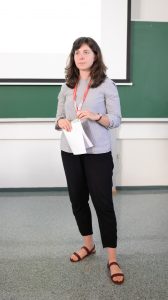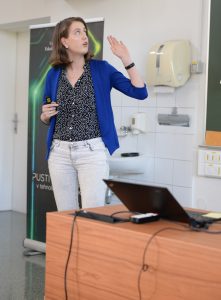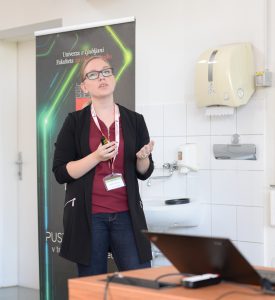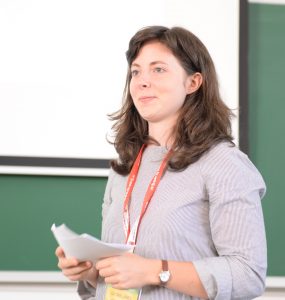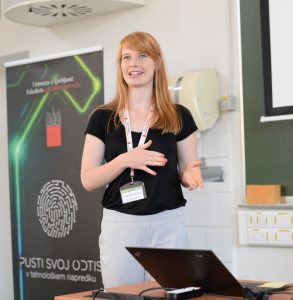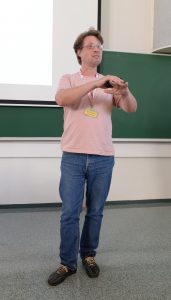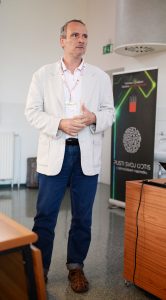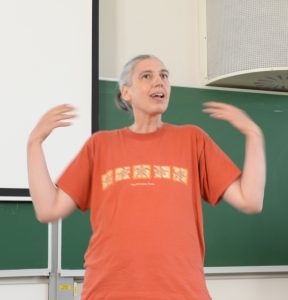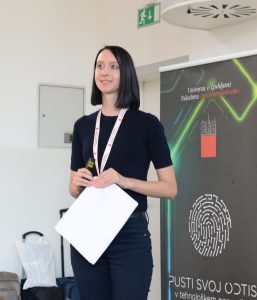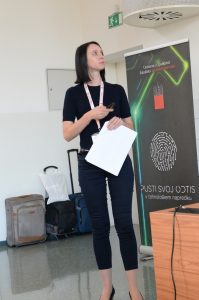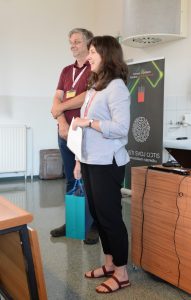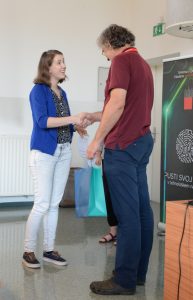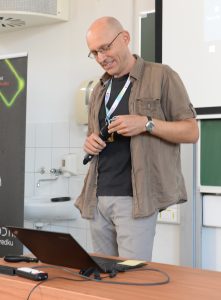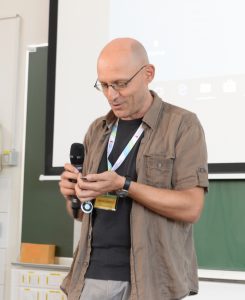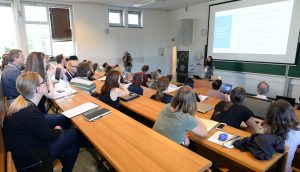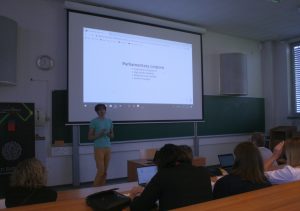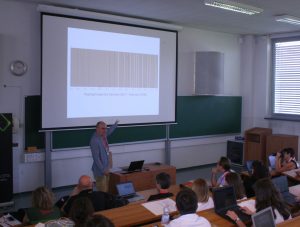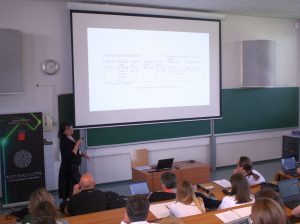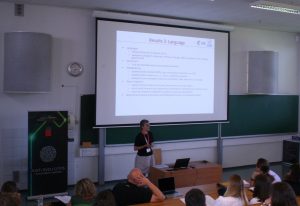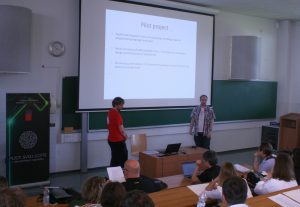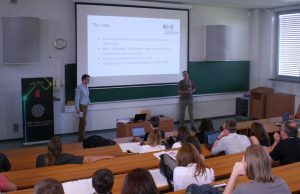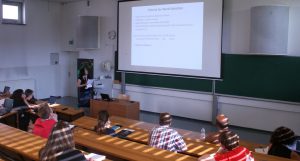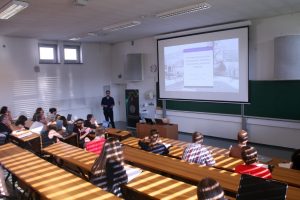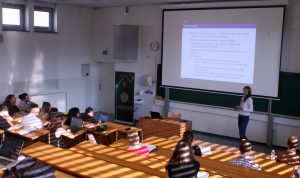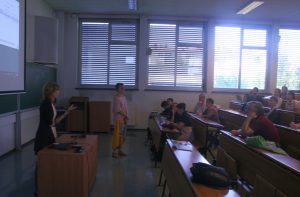Faculty of Electrical Engineering, University of Ljubljana
September 20-21, 2018
Slovenska stran: https://www.sdjt.si/wp/dogodki/konference/jtdh-2018/
The Slovenian Language Technologies Society (SDJT), the Centre for Language Resources and Technologies at the University of Ljubljana (CJVT), the Faculty of Electrical Engineering of the University of Ljubljana (FE) and the research infrastructures CLARIN.SI and DARIAH-SI have organised the conference “Language Technologies and Digital Humanities” on 20 and 21 September 2018. The conference has more than a 20-year tradition, and in 2016, the thematic expansion to digital humanities was introduced.
- Conference proceedings
- Conference schedule
- Thematic areas of the conference
- Invited speakers
- Instructions for authors
- Important dates
- Registration and fees
- Accommodation and travel
- Organisation
- Programme committee
- Photo gallery
Thematic areas of the conference
The conference aimed to bring together researchers from various backgrounds and methodological frameworks. The main topics included but were not limited to:
- Speech and other mono- and multilingual language technologies
- Digital linguistics: translation studies, corpus linguistics, lexicology and lexicography, standardisation
- Digital humanities and historical studies, ethnology, musicology, cultural heritage, archaeology, and fine arts
- Digital humanities in education and digital publishing
We welcomed submissions that present guidelines, research, good practices, projects and results in these areas. The conference also included invited lectures, a student section, and roundtables on topics related to the conference. The official languages of the conference were Slovene and English.
Authors of selected papers will be invited to extend their JTDH 2018 papers for a special English issue of the journal Contributions to Contemporary History. The journal is indexed in the Scopus database. Each of the selected papers will go through the journal’s regular review procedure and should be prepared according to the journal’s guidelines.
Invited speakers
LANGUAGE TECHNOLOGIES:
Dr. Malvina Nissim,
Center for Language and Cognition Groningen
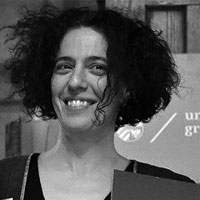

Too good to be true: Current approaches to author profiling
Abstract:
State-of-the-art performance on author profiling (e.g., gender and age) for English in social media is around 80%, or even higher. I will present systems that yield those results, but I will also question the reliability of such figures. Specifically, I will show that the same reasons why these models work are also the cause of serious performance drops when we change, even moderately, domain or topic. If we create conditions to bypass such powerful but at the same time limiting clues, we might be able to identify features that are indeed more relevant for profiling, and we will build more portable systems. I will describe experiments in this direction, exploring whether portability can be stretched even into a cross-language setting. I will also compare these flexible models to human performance in quite an interesting way!
Bio:
Malvina Nissim is Associate Professor in Language Technology at the University of Groningen, The Netherlands. She has extensive experience in sentiment analysis and author identification and profiling, as well as in modelling the interplay of lexical semantics and pragmatics, especially regarding the computational treatment of figurative language and modality. She is the author of 100+ publications in international venues, is member of the main associations in the field, and annually reviews for the major conferences and journals. She has recently co-chaired the Fourth Italian Conference on Computational Linguistics (CLiC-it 2017), and was the general chair of the Seventh Joint Conference on Lexical and Computational Semantics (*SEM 2018). She is also active in the field of resource and system evaluation, as both organiser and participant of shared tasks, and is interested in the philosophy behind them. She graduated in Linguistics from the University of Pisa, and obtained her PhD in Linguistics from the University of Pavia. Before joining the University of Groningen, she was a tenured researcher at the University of Bologna (2006-2014), and a post-doc at the Institute for Cognitive Science and Technology of the National Research Council in Rome (2006) and at the University of Edinburgh (2001-2005). In 2017, she was elected as the 2016 University of Groningen Lecturer of the Year.
dr. Martijn Kleppe,
National Library of the Netherlands


Bringing Digital Humanities to the wider public: libraries as incubator for DH research results
Abstract:
Digital Humanities researchers rely on large digital datasets. Since the National Library of the Netherlands (KB) has been digitizing its collection for about ten years, their datasets are popular amongst DH scholars that focus on historical newspapers, periodicals and books. By not only supporting researchers by giving them access to datasets, but also by collaborating with them, the KB aims to incorporate DH research results in their services and products. We do this by sharing our prototype tools and code on our online Lab , invite academics to come and work as researcher-in-residence and are full partner in research projects. In this talk I will describe the challenges and opportunities for libraries and academics when they collaborate. What can researchers gain from collaborating with libraries? And how can libraries bring the affordances of DH research to the wider public?
Bio:
Martijn Kleppe is Head of the Research Department of the National Library of the Netherlands (KB). Trained as historian, he wrote a dissertation on photographic iconic images by building and applying computational techniques. Before moving to the KB, he was a researcher in several Digital Humanities that focused on opening up audiovisual and textual archives by using techniques from the National Language Processing Domain, speech recognition and computer vision. At the KB, he now leads the Research Department that covers topics such as digital preservation, copyright, public library research, digital scholarship and improving the usability and discoverability of digital content.
Instructions for authors
The authors are invited to submit either a full paper or an extended abstract describing work to be presented at the conference. The extended abstract will be published in the book of abstracts and the full papers in the conference proceedings, which will be published on the conference website under the Creative Commons license at the beginning of the conference. We leave it up to the authors whether to submit their contribution anonymized or not.
The official languages of the conference are Slovene and English.
The extended abstracts should be 2-4 pages long and the full papers 6–8 pages. The camera-ready papers and extended abstracts should be formatted according to the conference guidelines:
- extended abstract: example, Word template
- full paper: example, Word template, LaTeX template
- templates are also avilable for papers written in Slovene, available from the Slovene page of the conference.
The contributions are collected using EasyChair by clicking on this link.
The authors of the contributions should indicate if it is a student contribution by adding “student paper” to the list of keywords. All the co-authors of student papers should be students. These papers will be presented in a separate student session and will be eligible for the best student paper award.
Important dates
- 15/04/2018 Extended deadline for submission of papers or extended abstracts
- 15/06/2018 Notification of acceptance
- 15/06/2018 Registration opens
- 31/08/2018 Submission of final papers or extended abstracts
- 01/09/2018 Registration deadline
- 20–21/09/2018 CONFERENCE
Registration and fees
- Registration fee:
- regular participants: 80 EUR
- students, co-authors and participants without a paper: free of charge
- Registration deadline: 01 September 2018
The condition for including the paper in the proceedings is that at least one registration fee is paid for each paper. Students, co-authors and participants without a paper can attend the conference free of charge but must register so that sufficient lecture rooms and coffee breaks can be organized. Free registration includes admission to the conference sessions and coffee breaks.
The registration fee for regular participants includes daily lunches at the restaurant of the Faculty of Electrical Engineering as well as the conference dinner, which will be held on Thursday 20 September 2018. Other participants have the option of buying tickets for daily lunches and/or the conference dinner. The price of the tickets is estimated to be 5 EUR for the daily lunch and 20 EUR for the conference dinner.
The registration fee will be collected by the Faculty of Electrical Engineering, University of Ljubljana. The registration will open on 15 June 2018 and the deadline for registration is 01 September 2018. After the deadline the participants will receive an invoice that will need to be paid by 16 September 2018.
Registration Form
Please fill out the registration form and click the “Pošlji // Submit” button below. Required form fields are marked with asterisks next to the labels. Your personal information will be used strictly for the organisation of the conference and will not be shared with any other persons, organisations or institutions.
Accommodation and travel
- A list of nearby hostels and hotels is available here
- Travel and transfer options to Ljubljana are explained here
- Ljubljana public transport is explained here
Organisation
Organising committee
- Simon Dobrišek (president, CJVT, FE)
- Vitomir Štruc (FE)
- Mojca Šorn (DARIAH-SI, INZ)
- Katja Zupan (SDJT)
- Jerneja Fridl (DARIAH-SI, ZRC SAZU)
Programme committee
Steering committee
- Asst. Prof. Darja Fišer, Faculty of Arts, University of Ljubljana and Jožef Stefan Institute (SDJT, chair)
- Assoc. Prof. Tomaž Erjavec, Jožef Stefan Institute (CLARIN.SI)
- Assoc. Prof. Simon Dobrišek, Faculty of Electrical Enginnering, University of Ljubljana (CJVT)
- Andrej Pančur, PhD., Institute of Contemporary History (DARIAH-SI)
- Iza Škrjanec (student section, SDJT)
Members
- Špela Arhar Holdt, PhD, Centre for language resources and technologies, University of Ljubljana
- Assoc. Prof. Zoran Bosnić, Faculty of Computer Information Science, University of Ljubljana
- Asst. Prof. Narvika Bovcon, Faculty of Computer Information Science, University of Ljubljana
- Asst. Prof. Václav Cvrček, Institute of the Czech National Corpus, Charles University in Prague
- Asst. Prof. Helena Dobrovoljc, Fran Ramovš Institute of the Slovenian Language, ZRC SAZU
- Jerneja Fridl, PhD, ZRC SAZU
- Polona Gantar, PhD, Faculty of Arts, University of Ljubljana
- Vojko Gorjanc, PhD, Faculty of Arts, University of Ljubljana
- Jurij Hadalin, PhD, Institute of Contemporary History
- Prof. Miran Hladnik, Faculty of Arts, University of Ljubljana
- Prof. Ivo Ipšić, Faculty of Engineering, University of Rijeka
- Asst. Prof. Mateja Jemec Tomazin, Fran Ramovš Institute of the Slovenian Language, ZRC SAZU
- Prof. Zdravko Kačič, Faculty of Electrical Engineering and Computer Science, University of Maribor
- Koraljka Kuzman Šlogar, PhD, Institute of Ethnology and Folklore Research, Croatia
- Iztok Kosem, PhD, Faculty of Arts, University of Ljubljana / Jožef Stefan Institute
- Mojca Kotar, PhD, University of Ljubljana
- Simon Krek, PhD, Institute “Jožef Stefan” / Centre for Language Resources and Technologies, University of Ljubljana
- Prof. Cvetana Krstev, Faculty of Philology, University of Belgrade
- Asst. Prof. Drago Kunej, Institute of Ethnomusicology, ZRC SAZU
- Asst. Prof. Nikola Ljubešić, Jožef Stefan Institute
- Asst. Prof. Nataša Logar, Faculty of Social Sciences, University of Ljubljana
- Assoc. Prof. Matija Marolt, Faculty of Computer Information Science, University of Ljubljana
- Prof. France Mihelič, Faculty of Electrical Engineering, University of Ljubljana
- Asst. Prof. Maja Miličević, Filološka fakulteta, Univerza v Beogradu
- Prof. Dunja Mladenić, Artificial Intelligence Laboratory, Institute “Jožef Stefan”
- Asst. Prof. Matija Ogrin, PhD, Institute of Slovene Literature and Literary Sciences, ZRC SAZU
- Assoc. Prof. Karmen Pižorn, Faculty of Education, University of Ljubljana
- Asst. Prof. Dan Podjed, Institute of Slovenian Ethnology, ZRC SAZU
- Prof. Marko Robnik-Šikonja, Faculty of Computer Information Science, University of Ljubljana
- Tanja Samardžić, PhD, University of Zurich
- Miha Seručnik, PhD, Milko Kos Historical Institute, ZRC SAZU
- Prof. Franc Solina, Faculty of Computer Information Science, University of Ljubljana
- Prof. Marko Stabej, Faculty of Arts, University of Ljubljana
- Kristina Štrkalj Despot, PhD, Institute of Croatian Language and Linguistics, Croatia
- Mojca Šorn, PhD, Institute of Contemporary History
- Asst. Prof. Jan Šnajder, Faculty of Electrical Engineering and Computing, University of Zagreb
- Asst. Prof. Janez Štebe, Faculty of Social Sciences, University of Ljubljana
- Simon Šuster, PhD, Computational Linguistics & Psycholinguistics Research Center, University of Antwerp
- Toma Tasovac, Belgrade Center for Digital Humanities/Trinity College Dublin
- Asst. Prof. Darinka Verdonik, Faculty of Electrical Engineering and Computer Science, University of Maribor
- Assoc. Prof. Aleš Vaupotič, Research Centre for Humanities, University of Nova Gorica
- Prof. Špela Vintar, Faculty of Arts, University of Ljubljana
- Prof. Jerneja Žganec Gros, Alpineon Ltd., Slovenia

